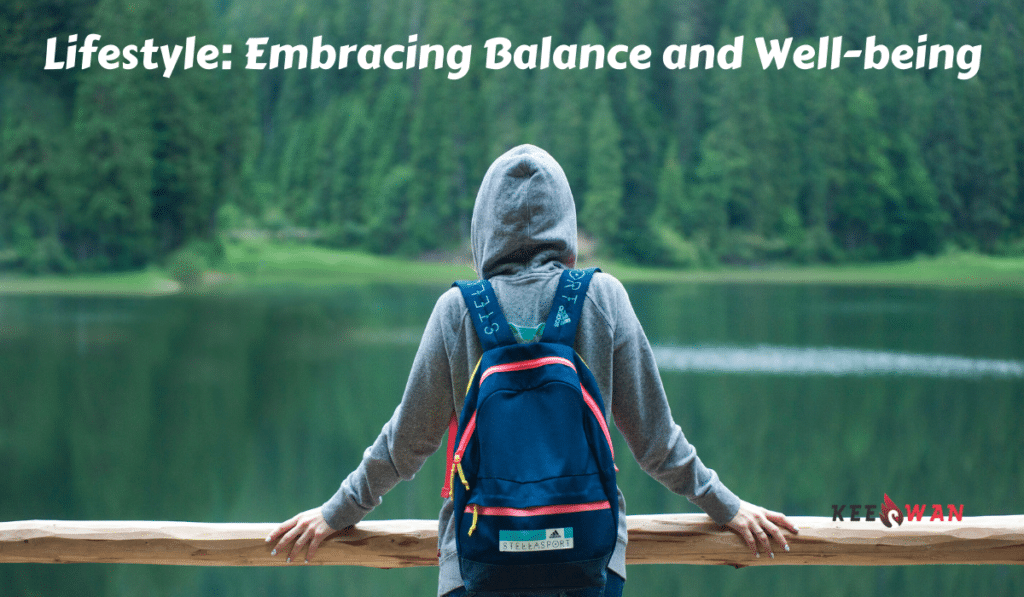Introduction
In today’s fast-paced world, lifestyle plays a crucial role in our overall well-being. It encompasses various aspects of our daily lives, from physical health to mental well-being, relationships, work-life balance, sustainability, and finding purpose and fulfillment. Adopting a healthy and balanced lifestyle can have a profound impact on our quality of life and overall happiness. In this article, we will explore the different dimensions of a fulfilling lifestyle and provide practical tips to help you enhance your well-being.
Defining Lifestyle
Lifestyle refers to the way we live our lives, encompassing our behaviors, habits, and choices. It involves the activities we engage in, our preferences, and the values we hold. A lifestyle is unique to each individual, influenced by personal circumstances, cultural background, and societal norms. It is a reflection of our priorities and the conscious choices we make on a daily basis.
The Importance of Lifestyle Choices
Our lifestyle choices have a direct impact on our physical health, mental well-being, and overall satisfaction with life. Making conscious decisions that prioritize self-care, relationships, and personal growth can lead to a more balanced and fulfilling existence. By embracing a holistic approach to lifestyle, we can optimize our physical and mental health, nurture meaningful connections, and find joy in our everyday experiences.
Nurturing Physical Health
Taking care of our physical health is essential for leading a vibrant and energetic lifestyle. By incorporating the following practices into our routine, we can enhance our physical well-being:
Exercise and Fitness
Regular exercise is crucial for maintaining a healthy body and mind. Engaging in physical activities such as walking, jogging, or participating in sports can boost cardiovascular health, improve muscle strength, and enhance overall fitness. Find an exercise routine that suits your preferences and make it a part of your daily life.
Healthy Eating Habits
A balanced diet rich in nutrients is vital for optimal health. Include a variety of fruits, vegetables, whole grains, lean proteins, and healthy fats in your meals. Avoid processed foods and sugary beverages, and stay hydrated by drinking an adequate amount of water daily. Remember, nourishing your body from within is the foundation of a healthy lifestyle.
Sufficient Sleep and Rest
Adequate sleep and rest are essential for rejuvenation and repair. Aim for seven to eight hours of quality sleep each night to support your overall well-being. Create a relaxing bedtime routine and ensure your sleeping environment is comfortable and conducive to restful sleep. Allow yourself time to unwind and recharge.
Cultivating Mental Well-being
Our mental well-being is equally important as our physical health. By nurturing our minds and emotional states, we can enhance our overall happiness and resilience. Here are some practices to cultivate mental well-being:
Stress Management Techniques
Stress is a common part of life, but managing it effectively is crucial for maintaining mental balance. Explore stress management techniques such as deep breathing exercises, journaling, or engaging in activities that bring you joy and relaxation. Learn to identify stress triggers and implement strategies to mitigate their impact.
Mindfulness and Meditation
Practicing mindfulness and meditation can help calm the mind, reduce anxiety, and improve focus. Set aside dedicated time each day to engage in mindfulness exercises or meditation practices. This can be as simple as focusing on your breath, observing your thoughts without judgment, or engaging in guided meditation sessions.
Pursuing Hobbies and Interests
Engaging in activities you enjoy can be a source of immense joy and fulfillment. Whether it’s painting, playing an instrument, gardening, or any other hobby, make time for activities that bring you pleasure. Exploring new interests can also expand your horizons and provide new avenues for personal growth.
Building Meaningful Relationships
Human connection is fundamental to our well-being. Nurturing relationships and fostering meaningful connections can significantly impact our happiness and sense of belonging. Consider the following tips for building and maintaining strong relationships:
Maintaining Strong Social Connections
Invest time and effort in maintaining relationships with family, friends, and loved ones. Regularly connect with them through phone calls, video chats, or in-person meetings. Engage in meaningful conversations and actively listen to others. Building a support system can provide comfort, support, and a sense of belonging.
Effective Communication Skills
Communication is key to healthy relationships. Develop effective communication skills by practicing active listening, expressing yourself clearly and honestly, and being open to understanding different perspectives. Good communication fosters understanding, resolves conflicts, and strengthens bonds.
Balancing Work and Personal Life
Finding a balance between work and personal life is essential for overall well-being. Set boundaries to ensure you have dedicated time for self-care, relaxation, and pursuing activities outside of work. Prioritize quality time with loved ones and engage in activities that bring you joy and fulfillment.
Striving for Work-Life Balance
Achieving a healthy work-life balance is crucial for maintaining overall well-being and preventing burnout. Consider the following strategies to manage your time effectively and strike a balance between your professional and personal life:
Time Management Strategies
Implement time management techniques such as prioritizing tasks, creating schedules, and setting realistic goals. Break larger tasks into smaller, manageable chunks and allocate specific time slots for different activities. By optimizing your time, you can enhance productivity and create space for personal activities.
Setting Boundaries
Establish clear boundaries between work and personal life. Define specific hours for work-related activities and ensure you dedicate time to unwind, relax, and engage in activities outside of work. Communicate your boundaries effectively with colleagues, clients, and family members.
Prioritizing Self-Care
Self-care is essential for maintaining overall well-being. Prioritize activities that recharge and rejuvenate you, whether it’s reading a book, taking a long bath, practicing mindfulness, or spending time in nature. Remember, taking care of yourself enables you to show up fully in all areas of life.
Embracing a Sustainable Lifestyle
Being conscious of our impact on the environment is an integral part of a holistic lifestyle. By adopting sustainable practices, we contribute to the well-being of our planet and future generations. Consider the following steps towards a sustainable lifestyle:
Environmental Consciousness
Raise awareness about environmental issues and educate yourself about sustainable practices. Be mindful of your consumption patterns and make conscious choices that reduce waste and minimize your carbon footprint. Small changes, such as recycling, conserving energy, and using eco-friendly products, can make a significant difference.
Reduce, Reuse, Recycle
Implement the three R’s: reduce, reuse, and recycle. Reduce excessive consumption by buying only what you need and avoiding single-use items. Reuse items whenever possible and recycle materials to divert waste from landfills. Embracing a circular economy mindset can contribute to a more sustainable future.
Conscious Consumption
Make informed choices when it comes to purchasing products and services. Support brands and businesses that prioritize sustainability, ethical practices, and social responsibility. Consider the environmental and social impact of your choices, and opt for sustainable alternatives whenever feasible.
Finding Purpose and Fulfillment
A fulfilling lifestyle goes beyond material possessions and external achievements. Finding purpose and meaning in life is essential for long-term happiness and well-being. Consider the following strategies to discover your passions and lead a purpose-driven life:
Setting Personal Goals
Define clear goals that align with your values and aspirations. These goals can be related to personal growth, relationships, career, or community involvement. Break them down into actionable steps and regularly review your progress. Setting and achieving meaningful goals provide a sense of purpose and fulfillment.
Discovering Passions and Talents
Explore your interests and talents to uncover activities that bring you joy and fulfillment. Engage in self-reflection, try new experiences, and embrace a growth mindset. By nurturing your passions and talents, you can cultivate a sense of purpose and enhance your overall well-being.
Giving Back to the Community
Contributing to the well-being of others can bring a deep sense of fulfillment. Find ways to give back to your community, whether through volunteering, mentoring, or supporting charitable causes. By making a positive impact on the lives of others, you create a ripple effect of kindness and fulfillment.
Conclusion
Creating a balanced and fulfilling lifestyle is a personal journey that requires conscious choices and ongoing effort. By prioritizing physical health, nurturing mental well-being, building meaningful relationships, striving for work-life balance, embracing sustainability, and finding purpose, you can enhance your overall well-being and lead a more satisfying life. Remember, small steps towards positive lifestyle changes can make a significant difference in your happiness and long-term satisfaction.
FAQs (Frequently Asked Questions)
What is lifestyle? Lifestyle refers to the way individuals live their lives, encompassing behaviors, habits, and choices.
Why is lifestyle important? Lifestyle choices have a direct impact on physical health, mental well-being, and overall satisfaction with life.
How can I improve my physical health? You can improve your physical health by incorporating regular exercise, maintaining a balanced diet, and ensuring sufficient sleep and rest.
What can I do to enhance my mental well-being? Cultivating mental well-being involves practicing stress management techniques, mindfulness, and engaging in hobbies and interests.
How can I achieve work-life balance? Achieving work-life balance involves effective time management, setting boundaries, and prioritizing self-care.





